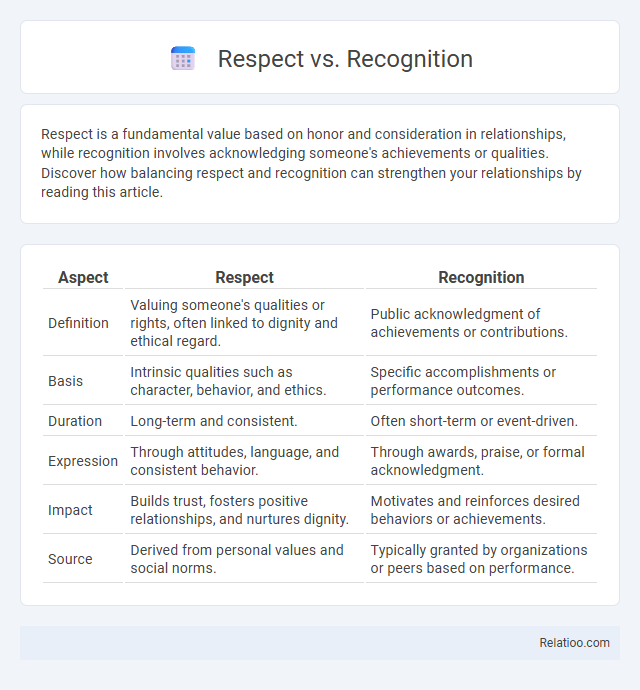Respect is a fundamental value based on honor and consideration in relationships, while recognition involves acknowledging someone's achievements or qualities. Discover how balancing respect and recognition can strengthen your relationships by reading this article.
Table of Comparison
| Aspect | Respect | Recognition |
|---|---|---|
| Definition | Valuing someone's qualities or rights, often linked to dignity and ethical regard. | Public acknowledgment of achievements or contributions. |
| Basis | Intrinsic qualities such as character, behavior, and ethics. | Specific accomplishments or performance outcomes. |
| Duration | Long-term and consistent. | Often short-term or event-driven. |
| Expression | Through attitudes, language, and consistent behavior. | Through awards, praise, or formal acknowledgment. |
| Impact | Builds trust, fosters positive relationships, and nurtures dignity. | Motivates and reinforces desired behaviors or achievements. |
| Source | Derived from personal values and social norms. | Typically granted by organizations or peers based on performance. |
Understanding Respect and Recognition
Respect involves acknowledging the intrinsic value and dignity of a person or their rights, often based on ethical or moral principles. Recognition refers to the act of identifying or validating someone's achievements, status, or contributions within a specific context or community. Understanding the distinction between respect and recognition is crucial: respect is a deeper, consistent appreciation tied to inherent worth, while recognition is often situational and linked to external accomplishments.
Defining Respect in Personal and Professional Contexts
Respect in personal contexts involves valuing others' feelings, boundaries, and individuality, fostering trust and empathy in relationships. In professional settings, respect emphasizes acknowledging colleagues' expertise, contributions, and maintaining ethical behavior to ensure effective collaboration. Defining respect requires understanding its role in promoting mutual dignity and positive interactions across both domains.
What Does Recognition Truly Mean?
Recognition truly means acknowledging someone's achievements, qualities, or efforts in a meaningful way that validates their contributions and value. It goes beyond mere awareness or respect by actively highlighting and celebrating specific accomplishments, often through praise, rewards, or formal acknowledgment. Recognition fosters motivation and engagement by making individuals feel seen and appreciated within their environment.
Key Differences Between Respect and Recognition
Respect involves acknowledging someone's inherent worth or qualities, often rooted in admiration and ethical values, while recognition specifically denotes acknowledging someone's achievements or contributions, typically in a formal or public manner. Respect is generally enduring and based on character or status, whereas recognition tends to be situational and tied to specific actions or accomplishments. Understanding these distinctions aids in fostering genuine interpersonal relationships and effective organizational practices.
The Psychological Impact of Respect vs Recognition
Respect cultivates a deep sense of personal value and psychological safety, reinforcing Your intrinsic worth and fostering self-esteem. Recognition often targets specific achievements, providing momentary boosts in motivation but lacking the enduring emotional impact of genuine respect. Regard merges elements of both, creating a balanced psychological environment where consistent respect enhances Your overall mental well-being more profoundly than episodic recognition.
Why Both Respect and Recognition Matter
Respect establishes a foundation of trust and dignity by valuing Your intrinsic worth, while recognition acknowledges specific achievements and contributions, motivating continued effort and engagement. Both respect and recognition matter because respect nurtures a positive environment essential for collaboration, and recognition reinforces desired behaviors and performance outcomes. Balancing these elements drives personal growth, loyalty, and overall success within teams and organizations.
Common Misconceptions About Respect and Recognition
Respect often involves acknowledging someone's inherent worth or abilities, while recognition typically refers to the acknowledgment of specific achievements or contributions. A common misconception is that respect must be earned through accomplishments, whereas respect can be a fundamental human right independent of success. Another misunderstanding is that recognition equates to respect, although recognition focuses on external validation and does not necessarily reflect deeper regard or esteem.
Cultivating a Culture of Respect in the Workplace
Cultivating a culture of respect in the workplace involves fostering an environment where employees feel valued, acknowledged, and appreciated for their contributions. Respect emphasizes honoring individual dignity, recognition highlights specific achievements and efforts, and regard reflects consistent positive esteem and consideration among colleagues. Prioritizing these elements leads to enhanced collaboration, increased employee engagement, and higher overall organizational effectiveness.
Effective Ways to Offer Meaningful Recognition
Effective ways to offer meaningful recognition involve understanding the distinctions between respect, recognition, and regard. While respect reflects a fundamental appreciation of someone's qualities or achievements, recognition is the explicit acknowledgment of specific contributions or successes, and regard denotes a deeper, enduring esteem. To make recognition meaningful for You, focus on personalized, timely acknowledgments that highlight individual strengths and demonstrate genuine appreciation beyond generic praise.
Balancing Respect and Recognition for Lasting Relationships
Balancing respect and recognition is crucial for fostering lasting relationships, as respect establishes a foundation of trust and ethical treatment while recognition validates individual contributions and achievements. High respect encourages open communication and mutual understanding, whereas consistent recognition maintains motivation and engagement. Prioritizing both elements creates an environment where people feel valued and empowered, strengthening relational bonds over time.

Infographic: Respect vs Recognition
 relatioo.com
relatioo.com